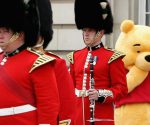Once, collect scrap metal; now, wear a mask: when is UK Government going to pay for its crime?
It’s yet to be seen to what extent the UK Government’s requirement for the wearing of face coverings in shops will be detrimental to foot fall traffic and therefore high street business income. However, one aspect of the requirement is quite plain: mask-wearing is meant as a device for perception management. When people see others wearing masks, it reinforces their own mask-wearing choices, as well as an impression of Covid-19 danger, irrespective of how unrealistic that is as a matter of fact. In other words, it is for maintaining compliant behaviour for the well being of authoritarianism – and this subject has been covered amply at FBEL.
The compulsion to wear masks is rather like the UK Government’s pressuring of the British public to get involved in collecting scrap metal for building armaments during the Second World War, and in particular, while the so-called Battle of Britain was ongoing. The following, which is the introduction to a behind-a-pay-wall piece at HistoryToday, serves as a very helpful introduction – and that’s why it is reproduced here verbatim. It betrays the Public Relations origins of what was a psychological operation to generate support for Britain’s continued warfaring even at the principle cost of civilian life. Moreover, it reminds that corporate-media has never been independent of the agenda of the British ruling class. Also note the appeal to the notion that collecting scrap was a way that women – undoubtedly the majority group in what could be called civilian population – could get involved in the war. This, of course, was quite criminal because it would undoubtedly have the effect of producing a tacit understanding that civilians were fair game for German bombers too; indeed, and as we will see, that UK Government was trying to create an impression of all Britons at war with Hitler is easily demonstrable from the Churchill speech that will be an object of study here.
An official notice appeared in British newspapers on 10 July 1940, the first day of the Battle of Britain. Attributed to Lord Beaverbrook, the press baron turned Minister of Aircraft Production, it was addressed directly ‘To the women of Britain’. The notice called on the reader to give up any aluminium that they could spare. It explained that the metal was needed to produce aircraft for the RAF’s fight against the Luftwaffe. It said: ‘We want it and we want it now. New and old, of every type and description, and all of it … The need is instant. The call is urgent. Our expectations are high.’
The appeal was the brainchild of J.B. Wilson, the former news editor of Beaverbrook’s Daily Express, who worked as the Ministry of Aircraft Production’s public relations officer. He was inspired by a campaign for scrap iron that had taken place in Germany three months earlier, but carefully designed Beaverbrook’s appeal to attract the attention of the British press.
The ministry also gained the support of the Women’s Voluntary Services (WVS), which had been set up in 1938, as war loomed, to encourage women to participate in civil defence.
Viewers of the 1970s ITV documentary, The World at War, may well have been surprised, then, when it featured a contributor (possibly Anthony Eden, the war time foreign minister, and post-war prime minister of Britain – verification is needed), explaining that the scrap collection was pointless in terms of its stated objective. Indeed, in spite of the pathetic excuse put about that Britain didn’t have the capacity to process the collected material, the notion that the scrap metal collection was not for producing armaments has pretty much solidified as an accepted fact, best overlooked.
Crucial for appreciating the cynicism of the scrap metal psyop (as part of the wider pretence of the need for civilian defence) is the fact that Britain could have arrived at a peace before the Battle of Britain, but the UK Government, after fomenting the war (see the guarantee of Poland) and being surprised by the German skill at executing it, found a scenario in continental Europe that it could not have envisaged and it needed to reverse. Britain was too weak to do it without US assistance, and so UK Government had to somehow sustain participation until such time the economic might of the USA could be brought to bear. Of course, none of this will be stated overtly in orthodox “court” history books, which will nevertheless carry evidence that could support the theory – although the reader will find the ideas broached by maverick historians. At the very least, it is a known fact in all quarters that the Battle of Britain could have been avoided, along with the 55,000 civilian casualties – amongst them 23,000 dead.
As well as the very real offer of peace that was extended to the UK Government from its German counterpart, there are many indications that Germany did not want to wage war on Britain that can be seen right up to the official start of the Battle of Britain. The Phoney War was an 8 month period between the September 1939 invasion of Poland (which could have been avoided without Britain’s guarantee against Germany) and the May 1940 invasion of France and the Low Countries, when there were no land hostilities on the line of contact between Germany and the Western allies (the Western Front). While the Germans concentrated their forces in the east to conquer Poland, the immediate danger on this front was dealt with in a month, and rapid redeployment of German troops to the French border is reckoned to be one of the reasons the French foray against German Saarland fizzled out in the same month of September as it started. No invasion of France followed. Indeed, anticipated German air attacks on Britain did not materialise.
Moreover, when the Germans moved against Denmark and Norway in April 1940, it could be argued that they were provoked to it by a display of Britain’s attitude regarding Norway’s neutrality with the Altmark incident (February 1940). In fact, the Germans invaded Denmark (tactically necessary for northwards movement of forces) the same day that Britain and France landed in Norway in an attempt to deny Swedish exports to Germany through Narvik.
Then, in what is anathema to orthodox historians, the Germans clearly gave the British time to evacuate at Dunkirk. This is a simple true fact, although there appears to be an official court history against which it is blasphemy to suggest that the German high command did not want to humiliate Britain. Official historians, however, can also not deny the simple truth of a German offer of peace to Britain after the fall of France.
Moreover, Germany’s conduct in the Battle of Britain could be argued as being designed with a view to maintaining prospects of peace, with escalations only stemming from British provocations. On the other hand, the British position, for a propaganda victory for its agenda, as now reflected by the orthodox history, was that Germany tried as hard as it could to force Britain to surrender, and failed. Also, Germany tried as hard as it could to denude British air forces for an upcoming invasion, and failed. In truth, and just as in the First World War, the Germans were tempted into a British propaganda trap. Unlike in the first campaign (the declaration of war on France in order to defend against Russia), the trap was avoidable, and yet the Germans allowed themselves to be provoked into doing things that they knew were militarily ineffective – for a short while, at least. The overlooked Battle of the Atlantic was arguably far more important in terms of German ambition than the Battle of Britain in that it had the same objective as the Battle of Britain (to deny capacity to fight, in this instance by disrupting imports to Britain) but was potentially more effective. The Germans persevered on this front for the entire duration of the war.
On 31st August, 1939, Hitler issued a directive (No.1) whereby operations against England were to:
…dislocate English imports, the armaments industry, and the transport of troops to France. Any favourable opportunity of an effective attack on concentrated units of the English Navy, particularly on battleships or aircraft carriers, will be exploited. The decision regarding attacks on London is reserved to me. Attacks on the English homeland are to be prepared, bearing in mind that inconclusive results with insufficient forces are to be avoided in all circumstances.
To be understood from this is that Hitler saw little point to attacks on non-military domestic English targets. On the 24th May, 1940, No.13 Directive set out the scope of German aerial warfare against Britain: “attacks on the blockade targets, as well as retaliation for RAF bombing of industrial targets in the Ruhr”.
This is interesting, because here we see the British forcing a change in the German approach. A lot had changed overnight since Churchill was selected as Prime Minister and installed in the office on 10th May, 1940. Although official history tells of an “uncoordinated effort” in the British Establishment to get rid of Chamberlain, with First Lord of the Admiralty Churchill’s debacle (yet another one) at Norway used to scapegoat the sitting Prime Minister, that the putsch happened simultaneously with the commencement of the German invasion of France would surely not be a coincidence. The author proposes that fearing a quick war, the UK Government wanted people in place at its front to keep Britain in the fight. While a representative parliament as the seat of power in Britain has long been an illusion, it’s a necessity that the military intelligence-financier amalgam that holds the reins (now, as it did in 1940) needs to maintain. As such, certain people, who will do what is bidden of them by their hierarchal superiors, need to be in place to work the machinery of democracy, and be seen to do it. Churchill was selected as being useful for giving the British people an appetite for the war, in the same way that Boris Johnson was selected for being useful in terms of fostering an appetite for a Fake Brexit.
Immediately on the installation of Churchill and his war cabinet, the RAF started to mount small scale night raids on residential areas in the Ruhr valley. An operational directive from Göring (commander of the Luftwaffe) on 31st June – 10 days before the official start of the Battle of Britain – ordered the destruction of the RAF, including the aircraft industry, with the aim of ending RAF bombing raids in Germany. Arguably, then, the objectives for the Germans in the Battle of Britain were what they had always been: to restrict British trade, and a capability to engage in war – but now especially in relation to direct attacks on the German domestic front. There was no realistic chance of a German invasion – so that reason for the Battle of Britain is a myth. As for forcing a surrender through blockade, the Germans ultimately looked to a wider front, the Atlantic Ocean, in those terms. The Battle of Britain was a propaganda trap that created sympathy for Britain in America (with a view to gaining American materiel, if not direct intervention), and gave the UK Government an opportunity to befuddle the British public – and it could and should have been avoided by the Germans. Defence against the RAF should have been staged at home. Instead, after the bombing of Berlin – the British had given themselves licence to engage in “unrestricted warfare” – on 25th August, from September into October, the last month of the Battle of Britain† the Germans famously took to the general bombing of London. The British public have been bombarded with film of firemen hosing down flaming and then collapsing buildings ever since.
The Germans lost 1977 aircraft in the entire campaign. The British lost 1744. In no wise can it be called a British military victory. It was, however, a propaganda coup – and the British had prepared and worked hard for it – and with a cavalier attitude to the fact of thousands of civilians sacrificed. Now consider Churchill’s most famous speech, made in the Commons on June 18th, 1940 – the Battle of Britain is several weeks away:
What General Weygand called the Battle of France is over. I expect that the Battle of Britain is about to begin. Upon this battle depends the survival of Christian civilization. Upon it depends our own British life, and the long continuity of our institutions and our Empire. The whole fury and might of the enemy must very soon be turned on us. Hitler knows that he will have to break us in this Island or lose the war. If we can stand up to him, all Europe may be free and the life of the world may move forward into broad, sunlit uplands. But if we fail, then the whole world, including the United States, including all that we have known and cared for, will sink into the abyss of a new Dark Age made more sinister, and perhaps more protracted, by the lights of perverted science. Let us therefore brace ourselves to our duties, and so bear ourselves that, if the British Empire and its Commonwealth last for a thousand years, men will still say, “This was their finest hour.”
It’s been said in these pages before that Churchill is such a criminal that his bones should be dug up and made to suffer humiliation in his living stead. In this speech, Churchill shows foreknowledge of the Battle of Britain. Court history often expresses a soft note of surprise that Churchill’s battle is the only one ever to have been named ahead of its being fought. This is because it was a public relations exercise in the form of a battle, planned for ahead of time, and executed by provoking the Germans to play their unwitting part.
In this speech, also, we see Churchill tell the lie of the “whole fury” of the enemy unleashed on Britain collectively in an attempt to win the war. In reality, the Germans had treated Britain with kid gloves up until that point in the war, and would take measures not to involve civilians in its raids on the British Isles. In reality, contrary to the responsibility that Churchill lodges with the British public, the Germans looked to beating Russia as a means to end the war. And in fact, the outcome of the war did depend on what happened in the east – another simple truth.
As Patrick J Buchanan argues, in his book Churchill, Hitler and the Unnecessary War, rather than saving the British Empire, Churchill endangered it, and caused it to terminate by not taking the offered peace with Germany – which Churchill, of course, does not mention in his most famous speech (soundings by the Germans were bound to have reached London through neutral, mutual contacts); the choices for the British according to him are fight or die. As for the survival of the British way of life, it wasn’t saved either. Churchill’s Second World War was exploited (as per design, we can safely speculate) for another phase in the creation of the City of London’s Masonic New World Order (as covered in the FBEL article, In which we observe H G Wells agitating for a New World Order in 1940).
In the biggest heap of chutzpah that he could muster, it was survival of civilisation itself, as Churchill ultimately told the British public, that depended on continuation of the war, and the British public’s not being broken by a dreadful assault that was sure to come unconditionally and without mitigation. The loathsome, fat, all-the-rations-eating glutton of a criminal! And what a good job for Churchill and his legacy that Germany did bomb the London that the dullard British would fill at Churchill’s state funeral so that the UK Government could collect news reel of fire surrounding St Paul’s Cathedral (the Germans rarely if ever hit a famous London landmark) as representation of Hitler’s efforts to break Britain, otherwise this speech would not have been validated, nor would it have had any credibility.
Naturally, as part of the British public’s new responsibility to save the world, Churchill included a sly appeal to the United States, because it was realised from the start (with not much confidence in Russia) that if the UK Government was going to survive its error of fomenting war by which Germany conquered most of the European continent, then America would have to come to the rescue. Also notice the ridiculous appeal to uphold a free Europe – a place which had never known British style freedom. This is unreal equivalence-making that has no doubt led to Britain’s membership of the EU. It should not have mattered to a Briton how Europe was ruled and who by, as long as Europe wanted peace with Britain. But Churchill was advocating for the ambitions of his military-intelligence/financier amalgam masters (colleagues), to which Germany was such a threat. He wasn’t advocating for the British people. He was only trying to trick them into participation in and sufferance of a war.
Now consider this – and note, officially, the Battle of Britain had already started:
BERLIN, July 19, 1940 (UP) — Adolf Hitler today addressed an “appeal to reason” to Great Britain to avert “destruction of a great world empire,” but he made it clear that rejection would mean an attack with all of the forces at the command of the Axis powers.
“In this hour and before this body,” the Nazi Fuehrer told the German Reichstag in the presence of Italian Foreign Minister Count Galeazzo Ciano, “I feel myself obliged to make one more appeal to reason to England.”
“I do this not as a victor, but for the triumph of common sense.”
Without delivering any ultimatum, Hitler said that it had never been on his desire or his aim to destroy the British Empire.
The Fuehrer warned against interpreting his appeal as weakness and said that “Churchill may parry my words with the claim that I feel doubt or fear, but in any case I will have my knowledge that I acted rightly, according to my conscience.”
The Fuehrer said that his cardinal aims in foreign policy had been friendship with Britain and with Italy.
“Despite my sincere efforts it has not been possible,” he said, “to achieve the friendship with England which I believed would have been blessed by both.”
The following, from the same source, is also interesting:
Hitler said documents found in France June 19 contained reports of secret meetings of the Allied War Council and that marginal notes by French Generalissimo Maxime Weygand and the then Premier Edouard Daladier showed the “machinations of the warmongers regarding all small nations.”
They intended, he said, “to use Finland for their own interest, turn Norway and Sweden into a theater of war and had planned the bombardment of Baku, violating Turkey’s neutrality.”
These “warmongers,” Hitler said, “inflicted an appalling fate on hundreds of thousands, even millions, of their own soldiers, callously enforcing mass evacuations for their own people.”
“What is coming will visit the people, not Churchill, who will probably be in Canada,” Hitler said in caustic reference to the British Prime Minster as a warning to the British people of the effects of blitzkrieg attack.
Ironically, while Hitler appealed to the British public to avoid being used as fodder for the cynical British ruling class, Churchill implicated them in a final battle for the survival of civilisation itself – which was a lie. Fat canker of a wicked criminal!
So, in 1940 the British were encouraged to collect scrap metal, that wouldn’t be used, in order to inveigle them into a tacitly agreed contract where they were fair game in war. (There were other measures and ways to fully contracting, such as compliance with rationing and interference by Government in cottage industry). But involvement in war was something that those on the other side of the conflict would have the British public avoid – not even by surrender, but by a letting things lie as they had developed, and as they were (in fact, some reckon that Germany would have been willing to withdraw from France, her interest only being in the east).
Likewise, the British now, in 2020, are told to wear a mask – a device that is useless – in order to contract with UK Government regarding supposed war waged against a virus that must be beaten or else a nation and a world be broken by it. In truth, it is fraud of the highest criminal order of the type that UK Government perpetrates generation after generation. It is crime that must, at long last, be paid for.
† To be entirely clear, here are pertinent definitions from Wikipedia:
The British officially recognise the battle’s duration as being from 10 July until 31 October 1940, which overlaps the period of large-scale night attacks known as the Blitz, that lasted from 7 September 1940 to 11 May 1941. German historians do not accept this subdivision and regard the battle as a single campaign lasting from July 1940 to June 1941, including the Blitz.



















“It’s yet to be seen to what extent the UK Government’s requirement for the wearing of face coverings in shops will be detrimental to foot fall traffic and therefore high street business income.”
I used to regularly visits shops in the local Arndale Centre. Since March I’ve only visited local food shops and I will continue to only visit local food shops as long as the requirement to wear a mask continues. I’ve also avoided relying on getting stuff online. I now go without if I can. Having to wear a mask does not encourage me to go to the shops, it does the exact opposite.
One other big “wartime” scam was income tax introduced in order to “fight” Napoleon.